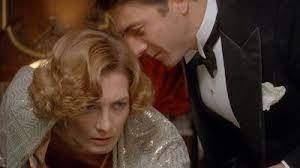Even those this is about a mini-series, I’m keeping this one short. Under the Bridge is the fictionalized account of the investigation into the murder of teenager Reena Virk in 1997. The series was based on two books, one by Virk’s father and Under the Bridge by Rebecca Godfrey.
Godfrey (played by Riley Keough who I say looks more like Priscilla, but my boyfriend looks more like Elvis) is made a character in the story even though she didn’t started researching the event until after the investigation began. As the series is more about the life that was lost and the societal problems which led a group of youths to violently kill more than the pure horror and morbid curiosity of true crime.
Godfrey is portrayed as a journalist trying to write a book about the young women who feel abandoned by her home city. She returns home just as her former girlfriend Cam, a local police officer played by Oscar winner Lily Gladstone, arrests a large group of teens for the murder of their classmate. As the different events leading to the death come to light, Godfrey develops a connection with one of the teens involved, Warren Glowatski.
The show brings up several ethical and important questions about true crime writing. Godfrey struggles with how much involvement she can have as a journalist. Cam points out that she can’t tell if Godfrey’s actions throughout the movie are genuine or for the sake of her book. The moral justification of her interviewing any of the kids when the trial is going on is questioned, especially as she seems to overlook the victim. At first, her closeness to Glowatski has her focused solely on how the justice system is railroading him (a homeless Native kid) and allowing middle class white girl Kelly Ellard to have a fairer trial. However, in focusing on these two, she forgets to tell the story of Reena and her family. Guilt and thoughts of her own family make Godfrey go back over her book and try to find out more about Reena. She presents the pages to Reena’s parents, apologizing that she didn’t do more in the first place.
Although, it is a little ironic that the show was about how writer must be so careful when writing a true story when they completely rewrote Godfrey’s life and involvement in order to have a better television series.





























